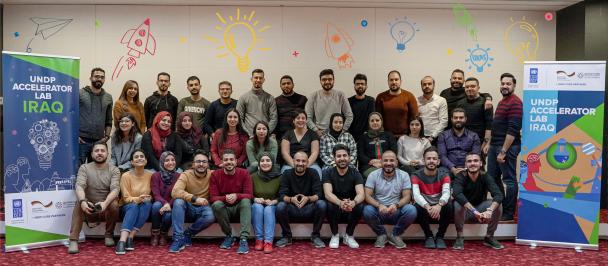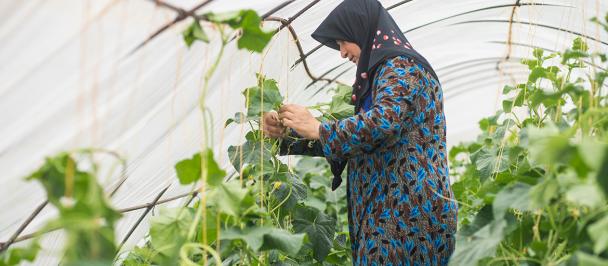Headway Programme
Headway Programme
| Title: | Strengthening the Long-Term Resilience of Subnational Authorities in countries affected by the Syrian and Iraqi Crises (regional project in Iraq and Lebanon. Iraqi activities implemented by UNDP and UN Habitat) |
| Status: | Closed |
| Duration: | 2019 – 2020 |
| Budget: | US$11.3 million provided by the EU Regional Trust Fund in Response to the Syrian Crisis, the ‘MADAD’ fund |
| Coverage: | 4 governorates (Dohuk, Erbil, Sulaymaniyah and Ninewa) |
| SDG: | SDG 8: Decent work and economic growth |
| Partners: | The Governments of Iraq and Kurdistan Region, UN-Habitat |
| Factsheet: | Fact Sheet 2019 |
Programme Summary
UNDP and UN-Habitat successfully launched the Headway programme in Iraq, in February 2019.
Funded by the European Union’s (EU) Regional Trust Fund in Response to the Syrian Crisis, the ‘MADAD’ fund, this programme is active in Lebanon and Iraq, two countries that continue to host a high number of Syrian refugees. The project aims to strengthen the long-term resilience of local government and the communities they serve. More specifically, the project aims to:
- Enhance the institutional capacities of local government to effectively identify and address the needs of the most vulnerable, with a special focus on youth and women, -Improve access to basic services by rehabilitating community infrastructure, including housing and small-scale water sanitation and hygiene infrastructure (WASH) and facilitating recognition of occupancy rights for refugees through lease agreements and the Social Tenure Domain Model;
- Facilitate local economic development and extend the provision of safe public services to the local population, through the provision of grants to fund and sustain micro, small and medium enterprises (MSMEs) with innovative and sustainable business models, particularly those owned by the most vulnerable;
- Provide internship and job-placement grants to medium-sized businesses, including those that can provide vital and life-saving public services and hire Syrian refugees, IDPs and host communities.
Over the course of two years, approximately 430,000 vulnerable people across the Governorates of Dohuk, Erbil, Sulaymaniyah and Ninewa will directly and indirectly benefit from the this programme. UNDP and UN-Habitat are responsible for the implementation of separate and complimentary activities which contribute to the overall project objectives.
Syrian refugees being trained by the renowned Kurdish celebrity, Helly Luv, to co-manage a beauty salon in Qushtapa camp, near Erbil. Photo: UNDP Iraq/2019
What have we achieved so far
- Conducted a labour-market assessment to identify sectors with high potential for economic growth throughout the Governorates of the Kurdistan Region of Iraq. Results showed that:
- Businesses are open to hiring Syrian refugees and internally displaced people and have a positive attitude towards integration;
- More than two-thirds already have staff who are refugees;
- There is perceived lack of incentives for the private-sector to hire refugees citing barrier such as language skills;
- Economic sectors with high-growth potential included: construction, manufacturing, Information and communications (ICT), wholesale and retail trade, hospitality and tourism, agriculture and public services (particularly health and education).
- Launched a Job Creation Grant Scheme to give the opportunity for businesses to apply for grants to finance intensive job-generating projects that employ Syrian refugees, IDPs and people from the local host community. 89 companies have applied for grants and 44 have been selected to receive support;
- Initiated support for entrepreneurs, businesses and startups working toward innovative business solutions that will positively impact the community with sustainable economic growth potential supported.
Grant provision has benefitted 463 persons, enabling first-time employment for 175 (35%) women, 139 internally displaced people and refugees, and 324 host community members. In total, almost 2300 working months will be generated.

 Locations
Locations

